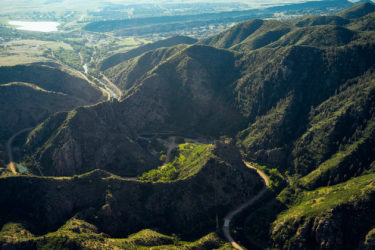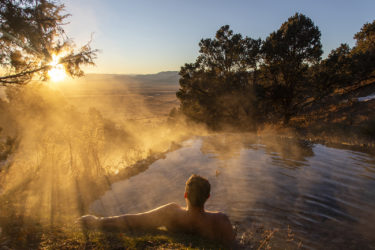The Local newsletter is your free, daily guide to life in Colorado. For locals, by locals.
Last month, Colorado’s Outdoor Recreation Industry Office (OREC) introduced Conor Hall as its new leader. The former director of conservation strategies for the Trust for Public Land is just the third person to head the office since it was created in 2015, and a lot has changed since then. Similar initiatives have spread across the country, with 15 states as diverse as Maine, Michigan, and Montana opening their own versions; the pandemic upended how we recreate outside; and the federal government estimated that the outdoor recreation accounted for 1.8 percent of the nation’s gross domestic product, or around $374 billion, in 2020.
OREC has transformed, too. What started as a one-person show tasked with serving as the central point of contact and connective tissue for Colorado’s outdoor industry, from nonprofits to outfitters to gear manufacturers, now has a staff of four with enough grant funding to effect real, on-the-ground change. So with just over a month under his belt, we decided it was about time to catch up with Hall to talk about where OREC’s been and where it’s headed next.

5280: How did growing up in Crestone, right next to the Pike-San Isabel National Forests and just north of Great Sand Dunes National Park and Preserve, impact your views on recreation and public lands?
Hall: That proximity to some really incredible nature gave me this deep love of just about every form of outdoor recreation. As I’ve gotten older and worked in politics and worked in conservation, I’ve come to feel strongly that access to nature and outdoor recreation should be right and not a privilege, and the reality is that well over a hundred million people—nearly a third of the country—don’t have that equitable access. That’s a pretty high priority for us. For example, we’re supporting gear libraries for underprivileged families and have partnerships with the U.S. Forest Service to get more kids who may not have access into those natural spaces.
You were an advisor on Governor Hickenlooper’s staff when OREC was launched in 2015. What need was the office created to fill?
The outdoor industry was a sleeping giant that the creation of state-level outdoor recreation industry offices has helped awaken. It’s a $30-billion-plus industry in Colorado that creates a huge amount of jobs, and we were realizing that it was so decentralized that it just never really had a cohesive voice or organizing faction. There’s the business side: outfitters, manufacturers, and retailers. You have a major nonprofit sector. You have higher education. We are using the power of the governor’s office and the state as a convening force to bring all the different, somewhat disparate, groups and interests together to create a greater aggregate change.
What kind of change?
I think the industry has continued to find its voice on important issues like climate change and the protection and growth of our public lands.
Such as when boycotting companies forced the Outdoor Retailer (OR) trade show to move from Salt Lake City to Denver?
Exactly. It was ironic that Utah created the first OREC office, and OR left due to Utah’s policies on public lands, among other things. I would be curious if that would have happened without the industry starting to come together a little bit through the creation of these offices.(Editor’s note: After this interview, OR announced it was returning to Utah in 2023, spurring renewed threats to boycott the event from more than 20 companies and Hall to speculate about Colorado creating its own rival event.)
The pandemic, in part, has led to record numbers heading into the outdoors, but it’s also led to overcrowded trails and other issues. Do people that depend on outdoor recreation for their livelihoods want to keep that momentum going? Or do they need a break to catch their breath?
You know, 92 percent of Coloradans recreate outside each year, and that number has likely gone up in the pandemic. So we’re probably pretty close to almost the entirety of the state recreating outdoors in some way. We want to keep that momentum, but we want to also make sure that we’re doing it in a sustainable way. As a state, we need to help everyone understand how to recreate responsibly and take care of the environment and hold others accountable. We’ll continue to work closely, for example, with the Department of Natural Resources and Colorado Parks and Wildlife on managing the flow of visitors and hopefully building new parks to expand that capacity.
What about the other issues facing the outdoor industry, such as the housing crisis in Colorado’s mountain towns, the fight for a living wage, and the labor shortage?
That’s the question so many of us are wrestling with right now, and there’s no easy answer. I think OREC will certainly play a role in those conversations, and we will bring whatever resources we can from the state. In terms of the labor shortage, I personally would like to see if we can do anything around J-1 visa reform. [J-1 visas allow students, teachers, interns, au pairs, and others to work temporarily in the United States.] In terms of housing, that’s a bigger problem we probably have less leverage on, but with this unprecedented amount of stimulus and potential infrastructure funding, I think there’s a chance to make some real progress in that space.
To that end, OREC is getting ready to give out millions of dollars in grants funded by federal stimulus programs. What does that mean for your office?
It’s kind of a new chapter. We’ve always had a number of different initiatives and programs, but we never really had the funds to back a lot of that up. More often than not, we were just the convening force. Now, with these grants, we will be the funding force, as well. There are probably going to be some bumps along the way as we figure out how to disperse these grants effectively and efficiently to drive positive economic change in terms of supporting businesses, supporting and creating new jobs, and all of those different pieces. But it’s really exciting. I think we’re going to be able to make a pretty big impact.
When you leave the office, what would you like your legacy to be?
I’m all about community and building connectivity, and I want us to really keep a focus on that. All these groups and all these interests pulling together are much greater in their aggregate than they are alone. Whenever my tenure ends, I want Colorado to continue to be looked at as a real leader in the space and leading the charge on national issues.








